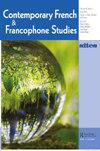Reinterpreting Africa’s Presence in the Global: Afrotopia, Diaspora, Return, and Global Black Reappropriation
IF 0.2
4区 文学
0 LITERATURE, ROMANCE
引用次数: 0
Abstract
AbstractFor the African continent, the global turn not only marks a significant shift in the nature of the relationships it maintains with other regions of the world but is also characteristic of increasing demands for internal sociopolitical changes. After a presence in the world through troubling times characterized by uncertainties and doubts, Sub-Saharan Africa is gradually writing its chapter on optimism and entering its Renaissance. However, recent protests in Francophone Africa, which are symptomatic of overwhelming social exasperations and of growing frustrations remind the necessity for the continent to reimagine new ways of responding to its internal social demands while reassessing its place in a more and more transnational global space. Consequently, reflections on the being-in-the-global of the continent entail crucial interrogations and analyses on the multidimensional axes of domination that define Africa’s relations with the rest of the world, while opposing them to the single axis relationships that symbolize colonial times. This work, therefore, calls for the continent’s awareness concerning the contemporary models of global relationships and their implications. It argues that the stakes of the continent’s presence in the global require both an Afrotopian vision and a global black response.Keywords: AfricaAfrotopiaReappropriationExtraversionglobalizationreturn Additional informationNotes on contributorsPatoimbasba NikiemaPatoimbasba Nikiema is an Assistant Professor of French and Francophone Studies, Global Black Studies and Afropean Studies at the Michele Bowman Underwood Department of Modern Languages and Literatures at the University of Miami. He is currently working on the participation of African and Afrodiasporic authors in Afrotopia and explores the return from exile in Caribbean and African literary productions.重新诠释非洲在全球的存在:非洲乌托邦、散居、回归和全球黑人再占有
摘要对非洲大陆来说,全球转向不仅标志着它与世界其他地区保持的关系性质的重大转变,而且还具有对内部社会政治变革日益增长的需求的特征。在经历了充满不确定性和疑虑的动荡时期之后,撒哈拉以南非洲正在逐渐书写乐观主义的篇章,并进入复兴时期。然而,最近在非洲法语国家发生的抗议活动是压倒性的社会愤怒和日益增长的挫折感的症状,这提醒了非洲大陆有必要重新设想新的方式来回应其内部的社会需求,同时重新评估其在越来越跨国的全球空间中的地位。因此,对非洲大陆在全球中的存在的反思需要对决定非洲与世界其他地区关系的多维支配轴进行关键的询问和分析,同时将它们与象征殖民时代的单一轴心关系对立起来。因此,这项工作要求非洲大陆认识到全球关系的当代模式及其影响。它认为,非洲大陆在全球存在的利害关系既需要非洲乌托邦的愿景,也需要全球黑人的回应。作者简介:作者是迈阿密大学米歇尔·鲍曼·安德伍德现代语言文学系法语和法语研究、全球黑人研究和非洲研究的助理教授。他目前致力于非洲和散居非洲的作家在非洲乌托邦的参与,并探索从加勒比海和非洲文学作品流亡归来。
本文章由计算机程序翻译,如有差异,请以英文原文为准。
求助全文
约1分钟内获得全文
求助全文
来源期刊

Contemporary French and Francophone Studies
LITERATURE, ROMANCE-
CiteScore
0.30
自引率
0.00%
发文量
43
期刊介绍:
An established journal of reference inviting all critical approaches on the latest debates and issues in the field, Contemporary French & Francophone Studies (formerly known as SITES) provides a forum not only for academics, but for novelists, poets, artists, journalists, and filmmakers as well. In addition to its focus on French and Francophone studies, one of the journal"s primary objectives is to reflect the interdisciplinary direction taken by the field and by the humanities and the arts in general. CF&FS is published five times per year, with four issues devoted to particular themes, and a fifth issue, “The Open Issue” welcoming non-thematic contributions.
 求助内容:
求助内容: 应助结果提醒方式:
应助结果提醒方式:


